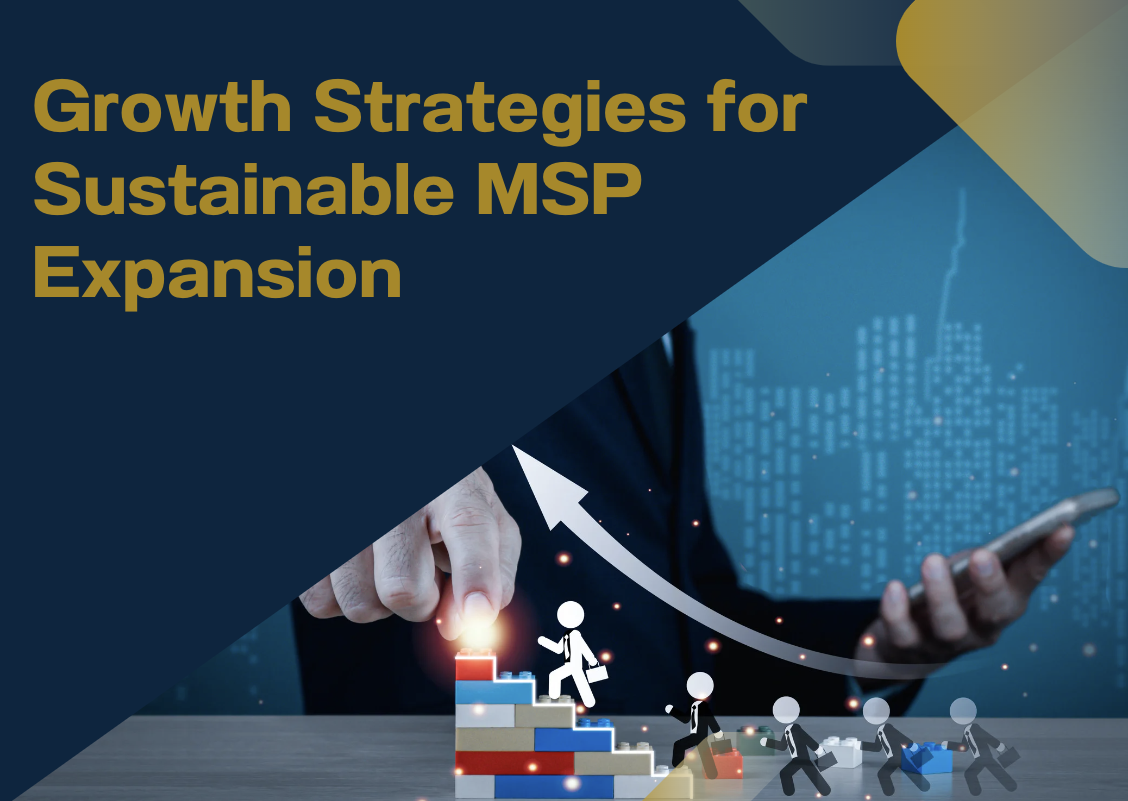Key Takeaways
- MSPs need to adopt growth strategies that help them scale their operations effectively, meet clients’ evolving needs, and stay ahead of the competition.
- Developing a scalable service portfolio and strengthening customer relationships are key strategies that MSPs can adopt to achieve sustainable business expansion.
- Optimizing operational efficiency and growing industry networking are other growth strategies that MSPs can adopt to achieve sustainable business expansion.
As an MSP advisor, I understand the importance of sustainable business expansion in the current market landscape. The demand for MSP services is steadily increasing, and MSPs need to adopt innovative growth strategies that can help them scale their operations effectively. However, it’s not just about expanding the client base; it’s about nurturing sustainable practices that ensure long-term success and stability in a competitive landscape. It’s also about being agile, responsive, and innovative—qualities that define market leaders.

To achieve sustainable business expansion, MSPs need to assess the market for service needs and identify new growth opportunities. Developing a scalable service portfolio is also crucial to meeting clients’ evolving needs and staying ahead of the competition. Strengthening customer relationships is another key strategy that can help MSPs build a loyal customer base and drive revenue growth. In addition to these, we will cover other aspects like optimizing operational efficiency, networking for growth, and leveraging Call To Action strategies to achieve sustainable business expansion.
Assessing the Market for MSP Services
As an MSP business owner, assessing the market is a crucial step in developing a growth strategy that will lead to sustainable business expansion. The market for MSP services is vast, and identifying the right target industries and evaluating local versus global opportunities are essential factors to consider.
Identifying Target Industries
For new MSP startups, identifying target industries is the first step in assessing the market for MSP services. Some industries are more likely to require MSP services than others. For instance, industries that rely heavily on technology, such as healthcare, finance, and education are more likely to require MSP services. These industries have complex IT needs and require specialized MSP services to manage their systems.
Once you have identified your target industries, you can tailor your services to meet their specific needs. For instance, if you are targeting the healthcare industry, you could focus on providing HIPAA compliance services, while if you are targeting the finance industry, you could focus on providing cybersecurity services.
Evaluating Local vs. Global Opportunities
When assessing the market for MSP services, it’s essential to evaluate local versus global opportunities. Local opportunities refer to businesses within your immediate geographical area, while global opportunities refer to businesses outside your immediate geographical area.
Local opportunities are ideal for MSP businesses that are just starting since they are easier to reach and require less travel time. Additionally, local businesses are more likely to trust a local MSP business than a global one.
On the other hand, global opportunities provide MSP businesses with a more extensive customer base and the potential for greater revenue. However, global opportunities require more resources, including travel costs, and may require additional certifications to meet different countries’ legal requirements.
Developing a Scalable Service Portfolio

Being an MSP advisor with years of experience, i’ve realized that developing a scalable service portfolio is essential to achieving sustainable growth. A scalable service portfolio is one that can be easily expanded or contracted based on the needs of your clients. Here are two strategies that can help you develop a scalable service portfolio.
Incorporating Automation and AI
Innovative strategies always win in the MSP industry. Incorporating automation and AI into your service portfolio can help you scale your services without adding additional staff. Automation can help you streamline your operations, reduce errors, and improve efficiency. AI can help you provide more personalized services to your clients, making your services more valuable and in-demand.
One way to incorporate automation and AI into your service portfolio is by offering remote monitoring and management services. Remote monitoring and management services allow you to monitor your clients’ systems and networks remotely, reducing the need for on-site visits. This can help you save time and money while providing improved services to your clients.
Focusing on High-Demand Solutions
Focusing on high-demand solutions is another way to develop a scalable service portfolio. This way you can ensure that your services are always in demand, allowing you to scale your services as needed.
One high-demand solution in the MSP industry is cybersecurity services. With the increasing number of cyber threats, cybersecurity services are in high demand. By offering cybersecurity services, you can help your clients protect their systems and data from cyber threats, while also providing a valuable service that can help you grow your business.
Another MSPs solution that is high in demand is cloud services. Cloud services are becoming increasingly popular, as they allow businesses to access their data and applications from anywhere, at any time. By offering cloud services, you can help your clients improve their productivity and efficiency, while also providing a valuable service that can help you grow your business.
Incorporating automation and AI and focusing on high-demand solutions are two strategies that can help you develop a scalable service portfolio. By developing a scalable service portfolio, you can ensure that your services are always in demand, allowing you to grow your business sustainably.
Strengthening Customer Relationships
As an MSP, building strong relationships with your clients is essential for sustainable business growth. Here are some strategies to strengthen customer relationships:
Prioritize Customer Success and Retention
To keep your clients loyal, it’s crucial to prioritize their success and retention. This means going above and beyond to ensure that their needs are met and that they are satisfied with your services. One way to do this is by providing proactive support and communicating seamlessly.
Implementing Proactive Support
Proactive support involves identifying and addressing potential issues before they become major problems. This can be done by monitoring your clients’ systems and networks for any signs of trouble and taking action to prevent downtime or other issues. By providing proactive support, you can help your clients avoid costly downtime and ensure that their systems are always up and running smoothly.
Enhancing Client Communication
Effective communication is key to building strong relationships with your clients. Make sure to communicate regularly with your clients to keep them informed about any issues or updates related to their systems. This can be done through regular check-ins, status reports, or other forms of communication. Additionally, make sure to listen to your clients’ feedback and take their concerns seriously. By enhancing client communication, you can build trust and ensure that your clients are satisfied with your services.
Optimizing Operational Efficiency
As an MSP, optimizing operational efficiency is crucial to sustainable business expansion. In this section, I will discuss two key strategies for achieving this goal: adopting lean management practices and leveraging strategic partnerships.
Adopting Lean Management Practices
Lean management is a methodology that focuses on reducing waste and maximizing value for customers. By adopting lean management practices, MSPs can streamline their operations, improve their bottom line, reduce lead times, improve quality, and increase customer satisfaction.
Leveraging Strategic Partnerships
Strategic partnerships can help MSPs achieve economies of scale, access new markets, and reduce costs. To leverage strategic partnerships, MSPs should focus on building relationships with complementary businesses that share their values and goals.
One way to build strategic partnerships is by participating in industry associations and events. By attending these events, MSPs can network with other businesses in their industry and identify potential partners.
Another way to build strategic partnerships is by offering co-branded services with complementary businesses. By offering these services, MSPs can expand their offerings and provide more value to their customers.
In summary, optimizing operational efficiency is key to sustainable business expansion for MSPs. By adopting lean management practices and leveraging strategic partnerships, MSPs can streamline their operations, reduce costs, and increase their bottom line.
Read More: The Benefits of Strategic Partnerships in the MSP Ecosystem
Networking for Growth
Networking is a critical component of business development for MSPs. Industry events and conferences offer MSPs an opportunity to create new business relationships and uncover new opportunities.
Maximizing Conference Participation
Attending industry events and conferences can be an effective way to raise the profile of an MSP and to connect with potential clients and partners. Here are some tips for maximizing the benefits of conference participation:
- Set goals: Before attending a conference, set clear goals for what you want to achieve. Whether it’s lead generation, brand awareness, or knowledge exchange, having a clear objective will help you make the most of your time at the event.
- Be prepared: Research the conference agenda and speakers in advance. This will help you identify which sessions and events are most relevant to your goals. Additionally, bring plenty of business cards and promotional materials to hand out to potential clients and partners.
- Engage with attendees: Don’t be afraid to strike up conversations with other attendees. Networking is all about building relationships, and conferences provide a unique opportunity to connect with like-minded professionals in your industry.
- Follow up: After the conference, follow up with the contacts you made. Send a personalized email or LinkedIn message to thank them for their time and to continue the conversation.
Related Posts:
How Call To Action Can Help?
As an MSP looking to grow your business sustainably, it’s essential to have a comprehensive growth strategy in place. One effective way to achieve this is by leveraging my tactics drawn from years of experience in helping various MSPs achieve their growth objectives.
I provide MSP advisory services to help IT managed service providers like you achieve sustainable growth through quality talent resource, client retention strategies, and team management. I can also help you develop and implement effective strategies that drive growth metrics. Get in touch with Dori Spade today.



